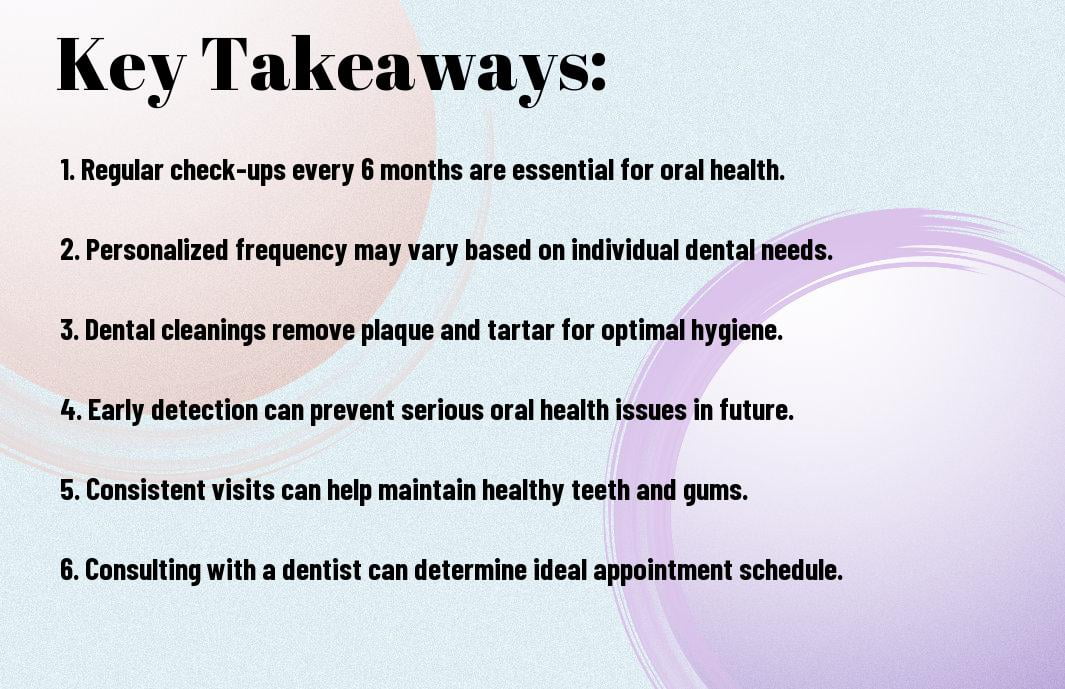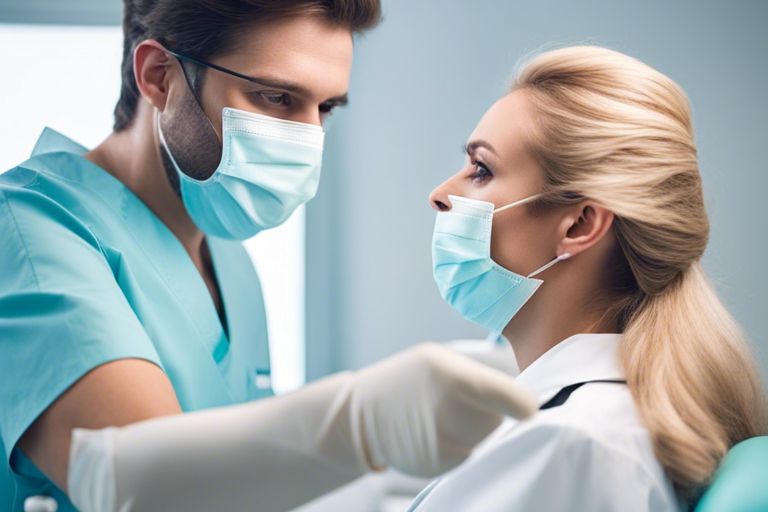Ensuring regular dental check-ups and cleanings is essential for maintaining your oral health. According to experts, you should visit the dentist at least twice a year for routine check-ups and cleanings to prevent oral health issues such as cavities, gum disease, and oral cancer. However, if you are at a higher risk for these issues or have existing oral health problems, more frequent visits may be necessary. To learn more about the significance of routine dental check-ups, check out this article on how often do you need to see a dentist? by the BBC Future.
Key Takeaways:
- Regular dental check-ups are essential for maintaining proper oral hygiene and preventing dental issues.
- It is recommended to visit the dentist for routine check-ups and cleanings at least every six months.
- Your dentist may recommend more frequent visits if you have certain dental issues or a history of gum disease.
- Skipping regular dental check-ups can lead to the development of serious dental problems that may require extensive treatments.
- Investing in regular dental check-ups can save you time, money, and discomfort in the long run by preventing dental issues from progressing.

Understanding Dental Check-ups
Any good dental hygiene routine includes regular check-ups with your dentist. These visits are important for maintaining the health of your teeth and gums, as well as catching any potential issues early on. During a dental check-up, your dentist will not only clean your teeth but also screen for signs of gum disease, cavities, and other dental problems.
What Happens During a Dental Check-up?
During a dental check-up, your dentist will examine your mouth for any signs of tooth decay, gum disease, or other oral health issues. They will also perform a thorough cleaning, removing any plaque or tartar buildup that may have accumulated since your last visit. Your dentist may also take x-rays to check for any underlying issues that may not be visible to the naked eye.
Frequency of Dental Check-ups for Different Age Groups
The frequency of your dental check-ups may vary depending on your age and overall oral health. For most adults, it is recommended to visit the dentist for a check-up and cleaning every six months. However, if you have a history of dental issues or are at a higher risk for oral health problems, your dentist may recommend more frequent visits. Children and teenagers may need to visit the dentist more often to monitor the development of their teeth and ensure proper oral hygiene habits are being established.
The Role of Teeth Cleanings
Despite your best efforts to maintain good oral hygiene, there are still areas in your mouth that you may miss during your daily brushing and flossing routine. This is where professional teeth cleanings come into play. Regular teeth cleanings are an essential part of maintaining good oral health and preventing dental issues.
Benefits of Regular Teeth Cleanings
Scheduling regular teeth cleanings helps to remove plaque and tartar buildup that can lead to gum disease and tooth decay. Additionally, cleanings can help in the early detection of oral health issues, such as cavities, gum disease, and oral cancer. Your dental hygienist will also polish your teeth to remove surface stains, giving you a brighter smile.
Distinction Between Cleaning and Other Dental Procedures
It is important to understand that while teeth cleanings are a vital part of maintaining good oral health, they are different from other dental procedures such as fillings, root canals, and extractions. While cleanings focus on preventive care and maintenance, other procedures are often necessary to treat existing dental issues.
Factors Influencing Check-up Frequency
After assessing your oral health, your dentist will recommend the frequency of your routine check-ups and cleanings based on several factors. Some of the key factors influencing check-up frequency include:
- Personal dental hygiene and habits
- Risk factors for dental diseases
- Overall health conditions
- Past dental history
- Age
Any of these factors can impact how often you should visit the dentist for routine check-ups and cleanings.
Personal Dental Hygiene and Habits
How you take care of your teeth on a daily basis significantly impacts the frequency of your dental check-ups. If you maintain a strict oral hygiene routine, including regular brushing, flossing, and using mouthwash, you may require fewer visits to the dentist for preventative care. However, if your hygiene habits are not consistent, you may need to visit the dentist more frequently to avoid potential issues.
Risk Factors for Dental Diseases
Perceiving your risk factors for dental diseases is crucial in determining the frequency of your dental check-ups. Factors such as smoking, poor diet, diabetes, and a family history of dental issues can increase the likelihood of developing oral health problems. If you have these risk factors, your dentist may recommend more frequent check-ups to catch and address any issues early on.
Conclusion:
Presently, it is recommended that you visit the dentist for routine check-ups and cleanings every six months. This schedule allows your dentist to monitor your oral health, detect and address any issues early, and provide thorough cleanings to maintain the health of your teeth and gums. However, the frequency of your visits may vary based on your individual oral health needs, so it is important to discuss a personalized schedule with your dentist. Remember, regular dental visits not only help keep your smile healthy, but they can also save you time and money by preventing the need for more extensive and expensive dental treatments in the future.
FAQ
Q: How often should I visit the dentist for routine check-ups and cleanings?
A: It is generally recommended to visit the dentist for a routine check-up and cleaning at least every six months. However, the frequency may vary depending on your individual oral health needs. Your dentist will assess your specific needs and recommend an appropriate schedule for your routine visits.
Q: What happens during a routine check-up and cleaning at the dentist?
A: During a routine check-up, your dentist will examine your teeth, gums, and overall oral health. This may include taking X-rays, checking for cavities, and assessing the condition of existing dental work. Your dentist or dental hygienist will also perform a professional cleaning to remove any plaque and tartar buildup, and polish your teeth to remove surface stains.
Q: Why are routine check-ups and cleanings important for oral health?
A: Routine check-ups and cleanings are essential for maintaining optimal oral health. They allow your dentist to identify any issues early on, such as cavities or gum disease, and address them before they worsen. Professional cleanings also help to prevent the buildup of plaque and tartar, which can lead to tooth decay and gum disease if left untreated. Additionally, regular dental visits can help to detect and prevent other oral health issues, such as oral cancer.






